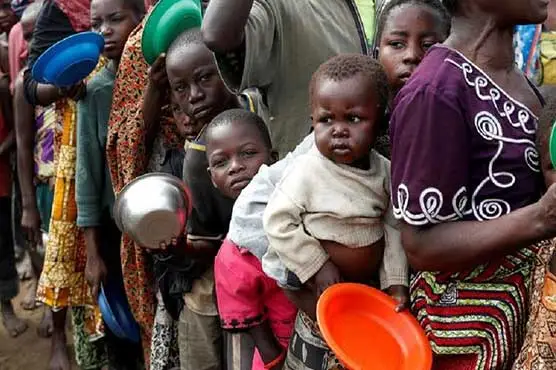479
Daniel Adaji
Despite The Ministry of Agriculture and Food Security, led by Minister Abubakar Kyari, disbursing over N11bn in 2024 for food palliatives and silo infrastructure, hunger continues to deepen across Nigeria, and the nation’s food storage facilities remain largely dormant.
According to information obtained by Pointblank News from BudgIT’s GovSpend platform on Saturday, N9.74bn was earmarked for procuring and distributing food—rice, beans, maize, and gari—to vulnerable Nigerians across all six geopolitical zones.
Dozens of contractors were awarded similar contracts, mostly worth N85.45m each, to deliver these supplies to federal constituencies.
From Kano to Akwa Ibom, and Lagos to Borno, disbursements occurred between February and November 2024. Yet, many communities report seeing little to no food.
In some states, multiple constituencies received allocations without visible impact.
For example, in Akwa Ibom, Ukanafun/Oruk Anam received palliatives via Cassell Consultancy Ltd, while Osogbo and Iwo in Osun received theirs through separate firms. Despite the paper trail, citizens continue to face empty markets and surging prices.
Beyond food distribution, an additional N1.41bn was disbursed for silo infrastructure. The largest contract—N822m—was awarded to Global Legend Integrated Concepts Ltd for rehabilitating a major facility in Lokoja, Kogi State.
Others, like FFA Continental Concept Ltd and Achhibat Nig Ltd, received hundreds of millions for similar projects. Still, there are no reports of increased storage capacity or operational silos. Most sites remain idle, raising fears that funds have been mismanaged or projects abandoned.
Efforts to get the Director of Strategic Reserve, FMAFS to confirm the quantity of food in the reserve proved abortive – he did not respond to calls and messages put across to him.
Critics argue that the palliatives, even if delivered, are, at best, a temporary fix.
Economist Shadrach Israel of Lotus Beta Analytics said, “N9.74 billion could have been channelled into sustainable agricultural development. Instead, we’re stuck with emergency handouts that don’t address inflation or systemic failures.”
La’ah Dauda, an agricultural economist, added, “Without investment in infrastructure and the agricultural value chain, the cycle of hunger will continue.”
Separately, N8.64bn was spent on various agricultural initiatives. These included equipment procurement, farmer empowerment, and distribution of inputs such as tractors, sprayers, and fertilizers. Contractors like Clean Deal Services Ltd, Tripod Engineering, and Robana Inter Ventures received millions for regional projects.
In January, the government announced Operation Empty the Store, a campaign to distribute agricultural equipment nationwide. The initiative aims to reach about 1,500 farmers per state, but experts remain sceptical about its impact in the face of high food inflation and persistent infrastructure gaps.
Almost three months past, nothing is said about when the farmers will benefit from this initiative and what input would be emptied from the stores to them and what location.
The president of the All Farmers Association of Nigeria, Ibrahim Kabir, blamed high transport costs—worsened by fuel subsidy removal—for rising food prices.
Israel warned that smuggling, inflation, and weak local production continue to undermine efforts. La’ah Dauda also noted that inconsistent policies, poor infrastructure, and governance failures are deepening the agricultural crisis.
Chancellor of the International Society for Social Justice and Human Rights, Dr Omenazu Jackson urged the government to allocate at least 35 per cent of national and state budgets to agriculture. “It’s time for serious investment, not surface-level interventions,” he said.



